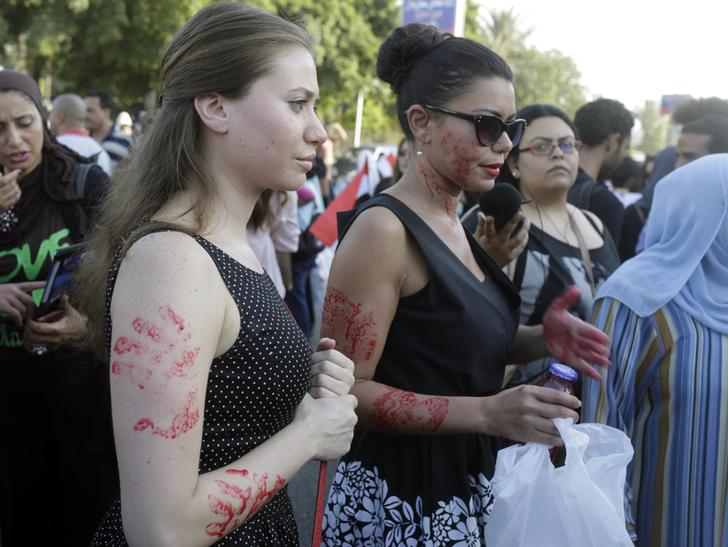By Farah Khairat and Sara Elmessiry
In some countries, womanhood is honored and held in incredibly high regard. In others, we’re equated to animals and objectified beyond expression. It was only once I’d moved to Australia that I learned that there are different degrees of being a woman – a “life lesson” that hit the young and ambitious me quite hard. And as I journey through countries, cities and my youth, it doesn’t seem to get easier.
There’s no doubt that women are mistreated all over the world. What changes, in my point of view, is how we react to such treatment. Just the other day, while celebrating my friend’s 18th birthday, a man on the street said, “nice night, ladies?” in a rather sexual tone. My friends didn’t pay much attention to it or even really notice but my reflex was to turn to him, throw him a dirty look and walk away.
I quickly realized that this reaction was the result of something that has simply become deeply entrenched in me because of my experience as a woman in Egypt. Even when I tried to stress to my friends the gravity of what had just happened, they remained nonchalant. It’s something that occurs so rarely, and usually doesn’t develop into anything more than an impolite comment, making their natural reflex to simply brush it off.
If this incident had happened in Egypt (and it has, too many times to be counted), we would have felt much more threatened. Whether physically, or mentally, the feelings of anger, disgust and fear remains.
There are many reasons why this discrepancy exists: While Australia is busy trying to get rid of the ‘Tampon tax,’ Egypt is still trying to catch up on eradicating female genital mutilation (FGM), and human trafficking. And I suppose because women’s issues are so personal and close to home for me, I tend to take every single snide remark to heart, despite being incredibly used to all these different forms of harassment.
Growing up in Egypt, you tend to get accustomed to things you really shouldn’t get accustomed to. Sexual harassment, unfortunately, is one of those things. The reason for this is probably because 99.3 percent of Egyptian women have been subject to some form of sexual harassment in their lifetime. At no point in any woman’s life should a man’s undesired sexual input be considered normal, or worse, expected.
Nonetheless, it saddens me that the only thing I could do in the aforementioned situation was shoot the impolite man a dirty look. I felt powerless as if I were walking the streets of Cairo again. My life as a woman in Egypt was one of restrictions and the constant feeling of inferiority. And that’s why traveling to Australia did me justice.
Living overseas has really allowed for me to develop as a person, especially in terms of independence and feeling truly liberated in every aspect – whether it be the right to my own body, or the right to simply be regarded as an equal. It’s refreshingly nice to not constantly be caught in conversations about marriage, other women’s promiscuity, or men insisting that they must pay for my dinner as if I were incapable of doing so myself.
I moved to Egypt when I was 13, and left when I was halfway through being 16. This was a truly crucial time for the development of any young girl, into a woman. At the time, I was entangled in so many viewpoints that I started to constantly contradict myself. I found myself trying to keep up with the expectations I held for myself as an independent woman, but also with those dictated by society. I even started to believe that sometimes, the man should pay for my dinner (which I know is absolutely ridiculous) and “protect” me. These are views that I would completely oppose now that I have looked at my experience with the benefit of hindsight.
The fault is not only in societal and cultural expectations, but also the way the media portrays these norms. Gender roles are portrayed in an overwhelming number of Egyptian advertisements; while this is easy to recognise if you are aware of the way media plays into shaping cultural expectations, the majority of Egyptians (especially those who are not privileged enough to receive a well-rounded education) will be blind to the power of the media.
Egyptian advertisements often use gender-specific pronouns when it comes to things that are, in the culture, usually connected to women. For example, while an advertisement for a restaurant will use gender neutral pronouns, another advertisement for cleaning or cooking supplies will almost always use female pronouns. This disparity implicitly portrays gender norms that are in line with cultural expectations.
After moving, I adopted a different way of perceiving others – especially other women – in a different light. In Egypt, it was as though I was clouded by cultural expectations and I had even started to develop some of the harmful perceptions and judgments we have of other women. However, despite all of this, I came to realize that, through living in a country where there is so much room for improvement, I have developed a lot more awareness and, in a sense, care for women’s issues. It allowed me to acknowledge the different types of issues that women face globally, as opposed to locally. It’s shaped me into becoming a feminist in the best way possible; it’s allowed for me to become someone I’ve always wanted to be.
Egypt is in a raw state of immeasurable potential. Yes, we do indeed have a long way to go but change comes slowly, and with the help of the mass media. There is so much beauty hidden within aspects of our culture and people that sometimes it’s easy to ignore the negatives.
May we all put our best foot forward. Not just on this celebratory day but every day of the week.







Comments (0)